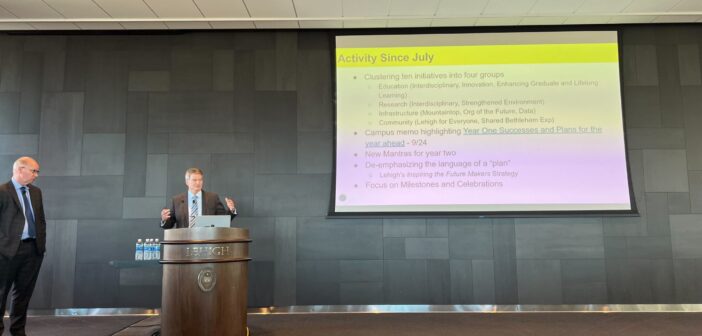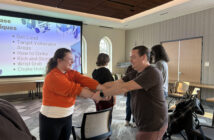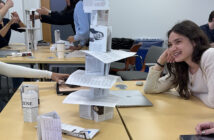President Joseph Helble, Interim Vice President Mark Erickson and other administrators provided an update at the biannual “Inspiring the Future Makers” town hall on the university’s 10-year strategic plan, which was announced in 2023 and aims to improve many aspects of the Lehigh community.
The plan was announced in 2023 and aims to improve aspects of the Lehigh community as it enters its second year. The university is looking to boost ratings in specific areas including retention rates and graduation rates. They are also looking to improve campus research centers and Mountaintop Campus.
Prior to the meeting, Erickson said he and Nathan Urban, provost and senior vice president for academic affairs, gave very similar presentations to the Lehigh student senate and graduate student senate to garner feedback on the strategic plan from “every corner” of the Lehigh community.
“There are lots of opportunities for people to be involved, Erickson said. “And, by and large, I think people’s reactions are good.”
About 30 faculty members attended the event on Tuesday, but no students were present. The town hall was also streamed and viewed by over 200 people online.
Helble said the plan will no longer be called a strategic plan — he wants to refer to it as a “strategy.”
Erickson said the strategy has a total of 50 action items set to be accomplished this year, and he wants to emphasize the need to implement the plan.
He said he hopes to achieve a goal of 95% first-year retention next year, up from 93.7% this year.
He said one way Lehigh can achieve their first-year retention goal is by more regularly engaging with first-year students, providing them with more feedback surveys and ensuring the various first-year programs are receiving sufficient funding.
He also said it’s important to consider the reasons why students leave.
“‘Why did you leave? What was it?’” Erickson said. “You find all sorts of different answers.”
Urban said Lehigh also hopes to implement an exploratory first-year semester, which would allow students to apply university-wide instead of applying to a specific college in the university.
The plan also has goals to increase the four-year graduation rate to 85%, compared to 79% last year.
Nancy Rogo Trainer, the associate vice president for facilities and campus planning, spoke about the emptiness on Mountaintop Campus. She said although Mountaintop has the space to accommodate many students, it has long been a struggle to get students from the Asa Packer Campus up to Mountaintop, often causing a feeling of emptiness.
“We just need more people,” Trainer said.
A primary vision of Mountaintop’s future is to transform it into a 24/7 mixed-use community that includes graduate student housing, biking and walking paths, more arts and additional research opportunities, Trainer said. Those involved in the plan also hope to implement more recreational activities like food trucks, ping pong tables and yoga clubs.
Currently, one of Mountaintop’s main purposes is to provide graduate research and doctoral education. She said those involved in the plan hope improving post-graduate education will help the entire campus thrive.
Trainer said the Department of Art, Architecture and Design saw a 48% increase between the fall 2018 and fall 2023 semesters.
She said applying for the Future Maker Grant could be advertised as “Mountaintop Activation,” and said the grant would provide up to $10,000 for events that generate activity on Mountaintop. These include “pop up” installations or community-building events.
Theater professor Melpomene Katakalos said she believes there’s a large number of possibilities for using Mountaintop. She suggested collaborations with other departments and community members to create performance-based events in Buildings B and C.
She said she hopes the university can use shared space like the Shed in New York City, which is used for art galleries and performances as inspiration.
“I just found out (about the grant), but I have several ideas brewing,” Katakalos said. “It would be a matter of bringing it back to my department, talking about it, and considering different possibilities.”
Another action item in the plan that was discussed in the town hall is the establishment of two additional research centers, to join the Catastrophe Modeling Center which recently became available to students. No further details about the research centers were provided in the presentation.
Students and faculty are encouraged to attend the strategic plan engagement events and provide feedback. Lehigh is expected to host a similar town hall during the spring 2025 semester, but no date has been announced yet.






Comment policy
Comments posted to The Brown and White website are reviewed by a moderator before being approved. Incendiary speech or harassing language, including comments targeted at individuals, may be deemed unacceptable and not published. Spam and other soliciting will also be declined.
The Brown and White also reserves the right to not publish entirely anonymous comments.